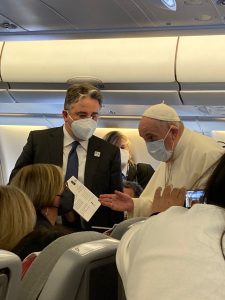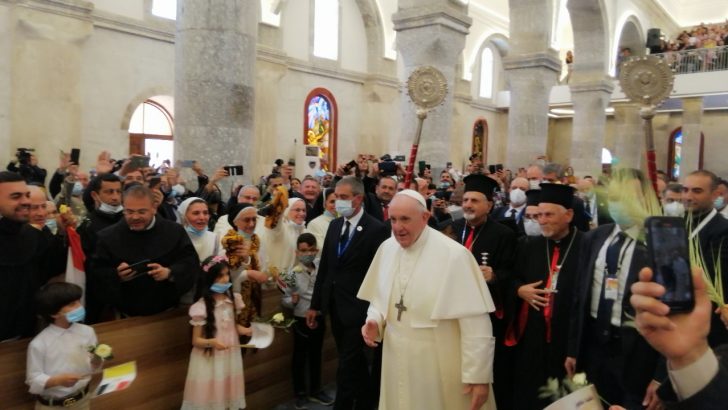It is hard to think of a country where the plight of persecuted Christians is highlighted so starkly as in Iraq. The decision by Pope Francis to travel to the Middle Eastern country was extremely brave. In the months leading up to the Papal visit there were a string of security alerts in Iraq. In advance of the visit, Monsignor Bashar Warda the Chaldean Archbishop of Erbil, told Aid to the Church in Need (ACN) that the Holy Father was determined to visit Iraq and the Pope would not call off the visit due to threats to his own life. Archbishop Warda explained the Pope understood he was visiting what is practically a warzone, and that was precisely why he was so determined to visit Iraq.
This Papal visit was extremely important to Iraq’s beleaguered Christian population. Before 2003, there were around 1.5 million Christians in Iraq. Accurate demographic information from Iraq today is very difficult to obtain, but according to Reuters there are now somewhere between 200,000-300,000 Christians in Iraq, mostly Eastern Catholics.
ACN staff who saw the aftermath of ISIS’s invasion of the Christian heartland in Iraq, the Nineveh Plains, feared that this was the end of Christianity in Iraq. By Divine Providence this was not the case. ACN, with the support of our benefactors, was at the forefront of providing aid to Iraq’s Christians. Between 2011-2020, ACN provided €49.5 million in aid to Iraqi Christians. Initially this aid was focused on providing humanitarian relief to refugees. After ISIS was defeated in 2017, ACN switched focus to rebuilding Christian homes and churches. ACN has helped reconstruct over 2,000 Christian homes in the Nineveh Plains, allowing for thousands of Christians to return home.

Pope Francis on the way from Rome to Baghdad. During the flight to Iraq, a spanish journalist gave the Pope a gift provided with the support of ACN.
Pope Francis was accompanied on his journey to Iraq by the Irish-born Head of Projects for ACN International, Regina Lynch. Regina travelled with the Papal delegation as a representative of ROACO, an organisation which represents Catholic charities (including ACN) who assist Eastern Catholics. The plight of Iraq’s Christians was the focus of the Papal visit. A Spanish journalist, Eva Fernandez, was determined to remind the accompanying press of this. During the flight to Iraq, Eva presented the Holy Father with several documents provided by ACN. This included a copy of a decree issued by ISIS demanding Christians pay the jizah, a special tax on non-Muslims. More disturbingly amongst the documents was a price list for Christian and Yazidi women and girls who were sold like cattle in slave-markets run by ISIS. Each age category had its own price, with the most expensive being that of girls under the age of 9 at €160. The fact that ISIS valued the life and future of a little girl at €160 shows how low human depravity can sink. This was a chilling reminder of why the Pope was visiting Iraq.
The Pope landed in Iraq on the 8th of March. After fulfilling the mandatory diplomatic obligations as the Vatican’s Head of State, the Pope visited Sayidat al-Nejat Syriac Catholic Cathedral in Baghdad to lead a prayer service. This was a highly significant visit and there was a reason why this was the first church the Pope visited in Iraq. In 2010, Al Qaeda militants massacred 48 Christians in the church. After receiving a jubilant reception by the local congregation, the Pope led a prayer service and spoke about the plight of Christians in Iraq. The following day the Pope met with Grand Ayatollah Ali al-Sistani. The Ayatollah is the most important religious leader in Iraq and the most senior Shia Muslim cleric in the world. Around 60% of Iraq’s population are Shia Muslims. The Ayatollah is extremely influential in Iraq. It has been reported he said to the Pope that he believes Christians should be allowed to live in peace in Iraq and should be equal citizens under the Iraqi constitution. This could potentially be a turning point for Iraq’s Christians, as Iraq’s Shia majority listen closely to what the Ayatollah says. Understanding the importance of prayer, the Pope then travelled to the ancient city of Ur, the birthplace of Abraham, to lead prayer for peace in Iraq.
The Pope finished his first full day in Iraq by celebrating Holy Mass in Baghdad’s St. Joseph’s Chaldean Catholic Cathedral, becoming the first Pope to celebrate Holy Mass in the Chaldean Rite. On the following day, 7th March, the Pope travelled north. First the Pope went to Mosul, which had served as ISIS’s capital in Iraq. Mosul is a city in ruins. It had once been the city with the largest Christian population in Iraq, now only 70 Christian families live there. The legacy of ISIS still looms large in the city’s ruined streets. In the shattered remains of Mosul’s Syriac Catholic church, the Pope led prayers for the victims of ISIS. Afterwards, the Pope travelled to the nearby Christian town of Quaraqosh. Like Mosul, it too had been overrun by ISIS. The town’s Al-Tahira Syriac Catholic church was left in ruins. With aid from ACN, the church was renovated and reopened for the Pope’s visit. According to Regina, this was the highlight of the visit. Religious sisters danced in joy at the arrival of the Pope. Surrounded by a young local Catholic congregation the Pope led the Angelus in the newly renovated church. This shows that Christianity in Iraq does have a future. Regina spoke of the strong faith of the local Christians, particularly that of a mother who forgave the ISIS militants who killed her son.
After visiting Quaraqosh, the Holy Father went to Erbil, the capital of Iraq’s Kurdish region, to celebrate Holy Mass in the city’s stadium. After celebrating the Eucharist, the Pope blessed a statue of Our Lady from Quaraqosh that ISIS had desecrated. The Pope spoke again about his solidarity with the Iraqi Christians, that they will always be in his heart, and how Our Lord God is with them always. The Pope thanked ROACO (including ACN) for their work in helping Iraq’s Christians. The following day, 9th March, the Pope left Iraq through Baghdad airport. Everything the Pope did in Iraq was done to offer material and spiritual support to the local Christians. As a Pontifical Foundation, ACN takes the example of the Holy Father very seriously. For this reason, ACN has announced a €1.5 million scholarship programme with the Catholic University of Erbil, to help educate the next generation of Iraqi Christians so they can secure a future for Iraq’s Christians.
To read more about ACN Ireland’s work and how you can help, visit: https://www.acnireland.org/donate
This feature is sponsored by Aid to the Church in Need Ireland


 Pope Francis entering Al-Tahira Syriac Catholic church in Quaraqosh, newly renovated with the support of ACN.
Pope Francis entering Al-Tahira Syriac Catholic church in Quaraqosh, newly renovated with the support of ACN. 